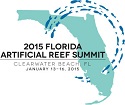 Artificial reef experts, fisheries scientists and reef managers from around the state and nation will come together to discuss current issues and exchange ideas for future projects at the 2015 Florida Artificial Reef Summit Jan. 13-16 in Clearwater Beach. The summit provides
Artificial reef experts, fisheries scientists and reef managers from around the state and nation will come together to discuss current issues and exchange ideas for future projects at the 2015 Florida Artificial Reef Summit Jan. 13-16 in Clearwater Beach. The summit provides
a rare opportunity for members of the state’s artificial reef community to hear recent research results, share experiences and generate new ideas, according to Bryan Fluech, Florida Sea Grant Agent with the UF/IFAS Extension in Collier County.
The last statewide Summit took place in 2010 in Cocoa Beach where over 180 participants including researchers, artificial reef program managers, marine contractors, natural resource managers, volunteer research diver organizations, and artificial reef citizen constituency organizations attended the event.
“We are excited to welcome these groups back to continue the discussion on how to move Florida’s artificial reef program forward,” Fluech said.
The theme of this year’s conference is “Navigating Expectations and Charting Objectives.”
“We chose the theme to reflect on the diverse perspectives of artificial reef use in Florida as well as discuss what it takes to responsibly plan for, manage, and evaluate a comprehensive artificial reef program in the Sunshine state,” Fluech said.
Florida Sea Grant, the Florida Fish and Wildlife Conservation Commission, and the University of Florida IFAS Extension Service are organizers of the event.
Florida has one of the most active artificial reef programs in the world with over 2,900 planned public artificial reefs placed off of its coasts. Everything from bridge rubble to specially designed concrete structures to retired naval ships has been deployed. Besides providing recreational fishing and diving opportunities, artificial reefs have also been used as substrate to support new oyster reefs, as erosion control structures to protect vegetated shorelines, as well as mitigation and restoration reefs to replace and repair natural hard bottom habitats lost through beach re-nourishment activities or vessel groundings.
“Artificial reefs drive a variety of economic activities that bring significant economic benefit to coastal communities,” Fluech adds. “A number of cost-benefit analyses in Florida show positive economic results, especially in the local economies directly impacted by the fishermen and divers that come to take advantage of the reefs.”
For more than three decades, Florida Sea Grant has contributed to Florida’s artificial reef program by developing and disseminating science-based information about the ecology of artificial reefs and their construction. Many of Sea Grant’s county-based extension faculty members assist local artificial reef programs by providing technical information that can improve the productivity and management of these reefs.
For more information on the conference, agenda and speakers, visit www.flseagrant.org/artificialreefs/summi
